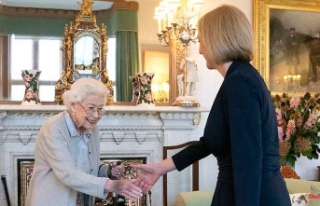The Union criticizes that Economics Minister Habeck put "ideology before reason" with his nuclear power plant decision on Monday. The Greens counter that the Union in particular has "brought Germany into this predicament".
Greens leader Omid Nouripour has rejected criticism from the Union about the shutdown of the remaining three nuclear power plants at the end of the year. "It is well known that the CSU, together with the CDU, have put us in this predicament in recent years. I would like to see a little more humility from the Union after everything it has done, what our country has done brought about this emergency," Nouripour told ntv, referring to the energy policies of the past few years.
The debate that the CSU is currently launching with a view to nuclear power plants is leading to "uncertainty among investors," said the Green Party chairman. "More nuclear plants mean more grid congestion, and that means fewer renewables, and that doesn't help."
On Monday evening, Federal Economics Minister Robert Habeck announced that the last three German nuclear power plants would go offline as planned at the end of December. Only the two southern German nuclear power plants Isar 2 and Neckarwestheim 2 are to be kept as emergency reserves from January to mid-April. On the other hand, the Union is demanding not only to leave all three nuclear power plants connected to the grid in "extended operation" beyond the winter, but also to order new fuel rods.
CSU regional group leader Alexander Dobrindt accused Habeck of "putting ideology before reason". In the "early start" of ntv, he also contradicted the Federal Minister of Economics that one could simply keep two nuclear power plants in Germany in reserve. "The companies themselves are saying that this is not possible," said the CSU politician: "A nuclear power plant in reserve operation, as one usually imagines reserve operations, that can be started up and shut down very quickly on demand, that works Not."
Nouripour, on the other hand, assured that it would be possible to predict early enough whether and when the nuclear power plants would have to be taken out of reserve in winter. "It is obvious that such a massive stressful situation does not arise overnight," he said. "You can anticipate and ramp up sufficiently quickly and then the nuclear power plants may also be of help. We all hope that it doesn't come to that." When asked how long it would take to start up a nuclear power plant, Nouripour said it was a matter of a few days, not weeks: "The time it would take to anticipate and take a close look at the weather forecast, that's there. "
Meanwhile, Nouripour's co-chair Ricarda Lang confirmed that the federal government wanted to quickly skim off so-called random profits from energy companies in order to finance the electricity price brake for consumers. "If that doesn't come quickly at European level, then we will implement it nationally," Lang told ntv.
It is still unclear how high the basic demand for the electricity price brake should be. Lang said: "It will probably be measured against the consumption of recent years and then be capped." This means that there is still a certain steering effect and an incentive to save. Lang added that the extent of the relief from the electricity price brake also depends on how much money could be earned by skimming off random profits: "It will also be related to how much money comes in via this mechanism."












